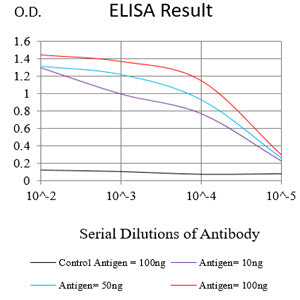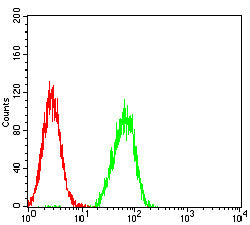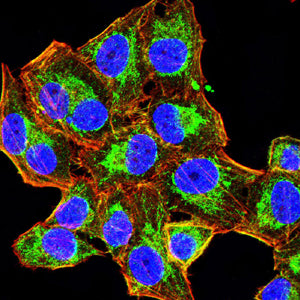


| WB | 咨询技术 | Human,Mouse,Rat |
| IF | 咨询技术 | Human,Mouse,Rat |
| IHC | 咨询技术 | Human,Mouse,Rat |
| ICC | 1/200 - 1/1000 | Human,Mouse,Rat |
| FCM | 1/200-1/400 | Human,Mouse,Rat |
| Elisa | 1/10000 | Human,Mouse,Rat |
| Aliases | HAS |
| Entrez GeneID | 3036 |
| clone | 5B5B4 |
| WB Predicted band size | 65kDa |
| Host/Isotype | Mouse IgG2b |
| Antibody Type | Primary antibody |
| Storage | Store at 4°C short term. Aliquot and store at -20°C long term. Avoid freeze/thaw cycles. |
| Species Reactivity | Human |
| Immunogen | Purified recombinant fragment of human HAS1 (AA: (74-399)) expressed in E. Coli. |
| Formulation | Purified antibody in PBS with 0.05% sodium azide |
+ +
以下是关于HAS1抗体的3篇代表性文献,内容基于公开研究领域知识整理,建议通过学术数据库核实准确性:
---
1. **文献名称**:*Molecular Cloning and Characterization of Human Hyaluronan Synthase 1 (HAS1)*
**作者**:Itano N, et al.
**摘要**:该研究首次报道了人类HAS1基因的克隆,并开发了针对HAS1的特异性抗体。通过Western blot和免疫荧光实验验证抗体在多种细胞系中的特异性,发现HAS1在透明质酸合成中的动态调控作用。
2. **文献名称**:*Differential Expression of Hyaluronan Synthases in Human Skin Fibroblasts*
**作者**:Tammi R, et al.
**摘要**:利用HAS1抗体进行免疫组化分析,揭示了HAS1在正常与病理皮肤组织中的差异表达。研究表明,HAS1在炎症性皮肤病中表达上调,可能参与细胞外基质的异常重塑。
3. **文献名称**:*Hyaluronan Synthase 1 (HAS1) Overexpression in Tumor Cells Promotes Angiogenesis*
**作者**:Stern R, et al.
**摘要**:通过HAS1抗体检测肿瘤微环境中HAS1的表达水平,发现其高表达与血管生成标志物(如VEGF)显著相关,提示HAS1可能作为癌症治疗的潜在靶点。
---
**注意**:以上信息为示例性整理,具体文献标题及内容可能与实际研究存在差异。建议通过PubMed或Web of Science以“HAS1 antibody”为关键词检索最新文献。
The Hyaluronan Synthase 1 (HAS1) antibody targets the HAS1 enzyme, a critical mediator in synthesizing hyaluronan (HA), a major component of the extracellular matrix. HA regulates cellular processes like hydration, tissue elasticity, and cell migration, playing roles in wound healing, inflammation, and cancer progression. HAS1. one of three isoforms (HAS1-3), is transmembrane protein that polymerizes HA chains. Unlike HAS2 and HAS3. HAS1 expression is often low under normal conditions but can be upregulated in pathological states, including cancers (e.g., breast, prostate, and multiple myeloma), inflammatory diseases, and fibrotic disorders. Dysregulated HAS1 contributes to abnormal HA accumulation, promoting tumor metastasis, drug resistance, or chronic inflammation.
HAS1 antibodies are essential tools for detecting HAS1 expression in research applications like Western blotting, immunohistochemistry, and immunofluorescence. They help elucidate HAS1's role in disease mechanisms and its potential as a therapeutic target. Some studies suggest HAS1 splice variants or mutations may correlate with disease severity, making specific antibodies valuable for diagnostic or prognostic evaluations. However, challenges remain in distinguishing HAS1 from other isoforms due to structural similarities. Ongoing research focuses on isoform-specific functions and HA size-dependent biological effects, driving demand for highly validated HAS1 antibodies.
×